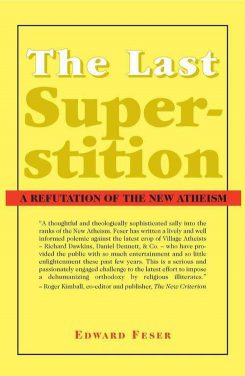Adam Weishaupt left a
comment
in another thread, and I’m conceited enough to think my reply is worth
reposting.
You know you will never agree, right?
This discussion can be likened with this: Imagine that there are only two people left in the world. One of them can only speak chinese, and the other can only speak arabic. No matter how much they talk with each other they will never understand each other. That is simply because they do not understand each others language. It is really the same with atheists vs christians or creationists vs evolutionists; the evolutionists leave out the possibility of the existence of God, so they can not understand the “language” of the Christians. On the other hand, the Christians leave out the possibility of the “non-existence” of God, so they can not understand the language of the atheists. Still, atheists try to prove their theories using their own language, and the same goes for the Christians.
You seem to be wrong on just about every point.
For starters, even using your analogy, I think you underestimate people’s ability to understand each other. A Chinese speaker and an Arabic speaker trapped on a desert island would, I’m sure, quickly work out some way of understanding each other.
the evolutionists leave out the possibility of the existence of God, so they can not understand the “language” of the Christians.
This is manifestly untrue. Kenneth Miller, the author of Finding Darwin’s God is an evolutionary biologist, the author of one of the standard High School textbooks in biology, was a witness at the Dover trial for the pro-evolution side, and is also a devout Christian.
Francis Collins, Obama’s choice to head the NIH, used to be the head of the Human Genome Project, is by all accounts a very good scientist, has said that even if there weren’t a single fossil, the DNA evidence alone would be sufficient proof of evolution, is also an evangelical Christian, and quite a vocal one. In fact, his book The Language of God is subtitled A Scientist Presents Evidence for Belief.
Hell, even in the ID camp, Michael Behe accepts common descent of humans with all other living creatures. I know this because I he told me personally when I sent him email about it.
It isn’t hard to find evolutionary biologists who are also Christians. You need to look around a bit more.
the evolutionists leave out the possibility of the existence of God
As shown above, this is patently untrue. And even if you meant to write “atheist” instead of “evolutionist”, you’d still be wrong. Read The God Delusion by Richard Dawkins, who is both an evolutionary biologist and a vocal atheist. In this book, which is all about atheism, he spends several pages making it quite clear that he does not exclude the possibility of a god’s existence.
I can’t think of a single atheist, either among the famous published writers or my friends and acquaintances, who categorically excludes the possibility that there might be a god out there.
You should also google “deconversion story” and read some people’s accounts of how and why they left their particular religion. You’ll find that in many, probably most cases, deconversion doesn’t happen overnight. It’s a long process that takes years. Often people give up each bit of faith only after a struggle.
Furthermore, most atheists, at least in the US, were raised religious and grew out of it. Many remember being believers quite well, so it’s not a question of never having thought the way a believer does.
On the other hand, the Christians leave out the possibility of the “non-existence” of God
Again, this is manifestly untrue. Every church I’ve ever seen has programs to help backsliders, help people strengthen their faith, ceremonies to help those who have stumbled in the faith to rejoin the flock, and the like. What does it mean to have “weak faith”, if not to admit the possibility that the god they were taught about doesn’t exist? In fact, the very existence of such programs and ceremonies tells me that even believers find it hard to believe in gods; that they want to believe, but often can’t manage to do so. After all, plumbers don’t have retreats to relearn to believe in water. Bankers don’t go to seminars to strengthen their belief in money. Yet theists apparently require these sorts of thing.
Or perhaps you’re saying that you, personally, are unwilling to admit even the possibility that there might not be any gods. That just means you’re closed-minded. You may want to work on that. It’s not a virtue.
(Thanks to
Eamon Knight
for the
title.)

